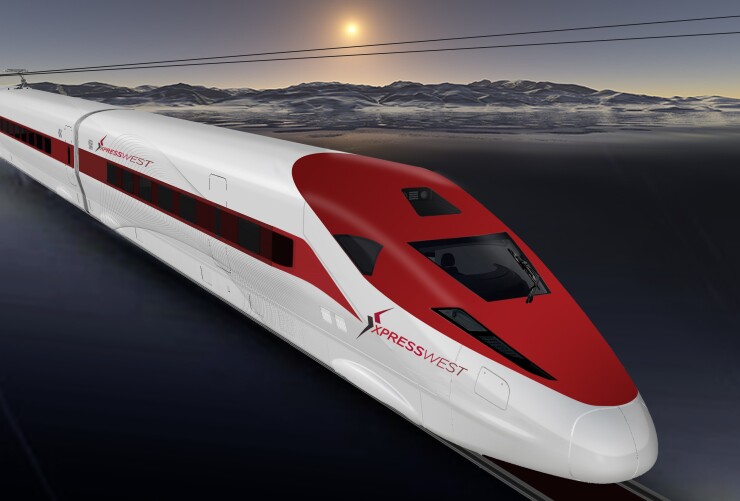The California Infrastructure and Economic Development Bank has agreed to be the conduit issuer for $3.25 billion of bonds for Virgin Train USA’s Victorville, California to Las Vegas rail line.
The deal would be the largest in IBank’s history, ahead of $1.65 billion issued in 2003 to fund seismic retrofit work on the San Francisco-Oakland Bay Bridge.

Virgin Trains will borrow the money to build 135 miles of rail in California and a passenger and maintenance facility in San Bernardino County. Another 35 miles of track and a train station are planned in Nevada.
“This is an exciting day, not just because it’s the largest bond request IBank has ever received and approved, but also because of what having high speed rail can do for Southern California,” said Nancee Robles, IBank’s acting executive director.
The $3.25 billion bond request IBank approved Wednesday is comprised of $850 million through the U. S. Department of Transportation and $2.4 billion in tax exempt, private activity bonds. IBank’s total figure includes the $600 million in PAB approvals expected from the California Debt Limit Allocation Committee chaired by Treasurer Fiona Ma.
Last month, CDLAC approved the first $300 million in tax exempt, private activity bonds, with another $300 million to be considered next year. The bonding authority through California’s debt limit allocation would allow Virgin to market up to four times that amount, or $2.4 billion in tax exempt, PABs, according to Internal Revenue Service guidelines.
IBank was created in 1994 to finance public infrastructure and private development in California and has the authority to issue tax-exempt and taxable revenue bonds, make loans, provide credit enhancement and leverage state and federal funds.
Virgin Trains also is seeking $950 million in private activity bonds from Nevada. It is requesting $200 million in bonds from the state’s debt limit allocation, which would allow Virgin to market $800 million in bonds. The remaining $150 million would come from the USDOT bond program. The Nevada allocations, as in California, would be split into $100 million increments over a two-year period.
The Nevada Department of Business and Industry is slated to consider the first half of the allocation at its Nov. 11 meeting.
Neither California, nor Nevada, would be responsible for repaying the debt.
The difference between the $4.8 billion cost and $4.2 billion in debt anticipated would be covered by an undisclosed source of equity.
“Our project continues to gain momentum and public support and this approval was a big step for our project,” said Ben Porritt, a Virgin Trains spokesman.
Virgin Trains USA was known as Brightline before a
A date hasn’t been set for the IBank sale, nor has a finance team been named, but Robles said the entire $3.25 billion would be sold in one transaction in a private placement. IBank typically sets a deadline for the sale between 180 and 240 days, or the beneficiary has to return to the board for further approvals, Robles said.
The Federal Rail Administration still needs to authorize the transaction and Virgin also has to complete an environmental impact statement for the California treasurer’s office prior to the sale.
The two factors that weighed in IBank board’s decision were the public benefit anticipated from the reduction in air pollution and that the project has a municipal sponsor in San Bernardino County, Robles said. The project, expected to take 4 million cars off the road annually, would have a significant impact on carbon emissions, Robles said.
Virgin hopes to break ground next year and begin operations in 2023 on the project. Ultimately, Virgin wants to construct a second phase that would connect Victorville, more than 60 miles from Los Angeles, to the larger city.





